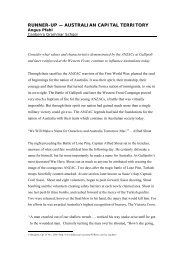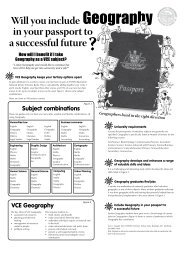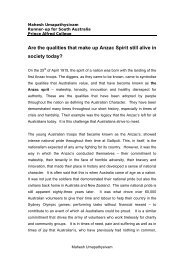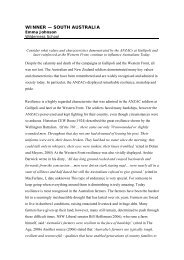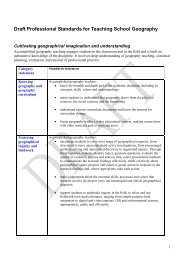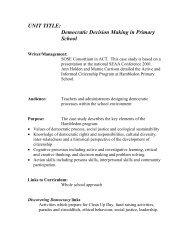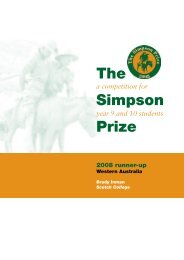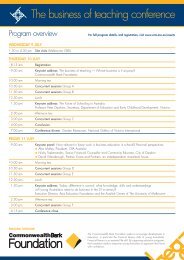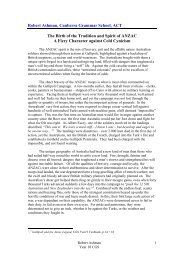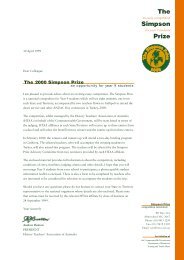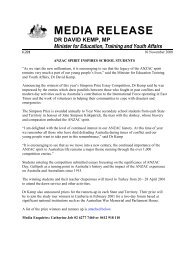SEAA Tomorrow: SOSE and the future Social education ... - afssse
SEAA Tomorrow: SOSE and the future Social education ... - afssse
SEAA Tomorrow: SOSE and the future Social education ... - afssse
- TAGS
- seaa
- sose
- afssse
- afssse.asn.au
Create successful ePaper yourself
Turn your PDF publications into a flip-book with our unique Google optimized e-Paper software.
<strong>SEAA</strong> <strong>Tomorrow</strong>:<br />
<strong>SOSE</strong> <strong>and</strong> <strong>the</strong> <strong>future</strong><br />
Rob Gilbert<br />
James Cook University<br />
The twenty-first birthday of <strong>the</strong> <strong>Social</strong> Education Association of Australia<br />
is a cause for celebration. Since <strong>SEAA</strong> was born in <strong>the</strong> early nineteen<br />
eighties, we have witnessed remarkable developments in <strong>the</strong> learning<br />
area, with real improvements in <strong>the</strong> range, depth <strong>and</strong> quality of what<br />
students now experience as <strong>the</strong> <strong>SOSE</strong> curriculum. We also have a much<br />
more sophisticated underst<strong>and</strong>ing of <strong>the</strong> curriculum <strong>and</strong> teaching<br />
processes needed to implement it. I would also argue that <strong>the</strong> origins of<br />
<strong>the</strong> <strong>SOSE</strong> curriculum were closely related to <strong>the</strong> development of <strong>SEAA</strong><br />
itself.<br />
On <strong>the</strong> o<strong>the</strong>r h<strong>and</strong>, <strong>the</strong>re is much still to do before we could claim that<br />
we have a genuinely well established professional culture among all<br />
<strong>SOSE</strong> practitioners, or a consensus about curriculum priorities <strong>and</strong> <strong>the</strong><br />
means to achieving <strong>the</strong>m. Some of <strong>the</strong> challenges we face are perennial<br />
ones intrinsic to <strong>the</strong> field; some need only a genuine will <strong>and</strong> concerted<br />
effort to resolve.<br />
I see my brief in this paper to be twofold: to provide a commentary on<br />
where we've been, <strong>and</strong> to offer some thoughts on continuing <strong>the</strong> work<br />
which <strong>SEAA</strong> has so effectively promoted. Knowing where we've come from<br />
is important in underst<strong>and</strong>ing <strong>the</strong> issues which face us today. The<br />
curriculum is after all what poststructuralists would refer to as a<br />
palimpsest, a text bearing <strong>the</strong> traces of past inscriptions <strong>and</strong> revisions,<br />
<strong>and</strong> its development gives insights into its present state. The second<br />
task, proposing <strong>future</strong> directions, is an indulgence that is kindly given to<br />
grey haired men <strong>and</strong> women in <strong>the</strong> optimistic hope that <strong>the</strong>y may have<br />
ga<strong>the</strong>red some wisdom over <strong>the</strong> years. In this case, I will offer some<br />
thoughts on what I see to be key issues for <strong>the</strong> <strong>future</strong> of <strong>SOSE</strong>.<br />
<strong>Social</strong> <strong>education</strong>: conception <strong>and</strong> conflict<br />
I cannot provide any systematic history of <strong>the</strong> learning area here, but<br />
would draw attention to what I believe were important issues <strong>and</strong><br />
milestones in <strong>the</strong> development of <strong>SOSE</strong> <strong>and</strong> <strong>SEAA</strong>, <strong>and</strong> <strong>the</strong> connections<br />
between <strong>the</strong> two.<br />
The direct origins of <strong>SEAA</strong> <strong>and</strong> <strong>SOSE</strong> might be identified in <strong>the</strong> nineteen<br />
seventies <strong>and</strong> <strong>the</strong> attempts to give social <strong>education</strong> an identity <strong>and</strong> a<br />
more comprehensive scope as a field. The establishment of <strong>the</strong> National
Committee on <strong>Social</strong> Science Teaching <strong>and</strong> <strong>the</strong> Curriculum Development<br />
Centre were important initiatives, signalling <strong>the</strong> first forays of <strong>the</strong><br />
Commonwealth government into curriculum development. An important<br />
outcome was <strong>the</strong> <strong>Social</strong> Education Materials Project (SEMP), with its<br />
innovative approach to materials development <strong>and</strong> school based<br />
curriculum decision making. SEMP was unlike anything we had seen<br />
before. It was stimulating, creative <strong>and</strong> forward looking, <strong>and</strong> opened up<br />
opportunities for addressing perennial <strong>and</strong> contemporary issues in<br />
exciting <strong>and</strong> engaging ways.<br />
However, SEMP was one of <strong>the</strong> first examples of what has become a<br />
common problem for <strong>SOSE</strong>, <strong>and</strong> one which I want to comment on later.<br />
SEMP was threatened by political censorship. It seemed that <strong>the</strong> attempt<br />
to promote an open <strong>and</strong> questioning approach to our society's taken for<br />
granted assumptions, to allow for student conclusions or interpretations<br />
which were not predetermined, <strong>and</strong> to exp<strong>and</strong> <strong>the</strong> curriculum beyond its<br />
traditional focus, was deemed to be unacceptably radical, or a conspiracy<br />
by some sectional interest. The Queensl<strong>and</strong> government at <strong>the</strong> time<br />
ensured SEMP's notoriety by banning it from schools, sending<br />
departmental officers into libraries <strong>and</strong> staff rooms to physically<br />
withdraw <strong>the</strong> corrupting items.<br />
An author of <strong>the</strong> unit on Family in <strong>the</strong> SEMP materials commented that<br />
. . . <strong>the</strong>re was not necessarily a spectrum of opinion on aspects of<br />
family life from right to left, or from conservative to radical – but a<br />
spectrum from tolerant to intolerant: a far more limited thing.<br />
(Madin, 1980, p. 50)<br />
This story has continued, with <strong>the</strong> writing of <strong>the</strong> National Statement in<br />
<strong>SOSE</strong> attracting similar controversy. In fact, one commentator has<br />
described <strong>the</strong> entire national curriculum as 'based on <strong>the</strong> belief that<br />
<strong>education</strong> should be used as an instrument to bring about social change,<br />
in particular, to create a society that embodies a left wing, progressive<br />
view in matters of gender, ethnicity <strong>and</strong> class' (Donnelly, 1993, p. 37).<br />
The crises in <strong>the</strong> writing of <strong>the</strong> national statement in <strong>SOSE</strong> were fur<strong>the</strong>r<br />
evidence of <strong>the</strong>se controversies (Gilbert, Gordon, Hoepper <strong>and</strong> L<strong>and</strong>,<br />
1992; Maye, 1998).<br />
Yet again, in 2000, <strong>the</strong> Queensl<strong>and</strong> <strong>SOSE</strong> syllabus was attacked in<br />
Brisbane's main newspaper for 'indoctrinating our children with Leftwing<br />
values', <strong>and</strong> for being 'stuffed to <strong>the</strong> gills with pro-environment<br />
preaching' <strong>and</strong> 'hostile to our society because it is based on <strong>the</strong> value of<br />
social justice where students seek to deconstruct dominant views of<br />
society' (Bolt, 2000, p. 33).<br />
2
The issues raised in <strong>the</strong>se kinds of debates are inevitable in a field like<br />
<strong>SOSE</strong>, where definitions of important learnings are closely related to<br />
notions of <strong>the</strong> good life, <strong>and</strong> explicitly linked to values of social justice,<br />
democratic process <strong>and</strong> sustainability. However, in <strong>the</strong> seventies we had<br />
little idea that this kind of controversy was to become so persistent. The<br />
ideas which drove SEMP <strong>and</strong> <strong>the</strong> NCSST were a desire to rethink <strong>the</strong><br />
field, to exp<strong>and</strong> its scope <strong>and</strong> to give it a new energy more relevant to <strong>the</strong><br />
times. Similar sentiments <strong>and</strong> energies ultimately produced <strong>the</strong> national<br />
curriculum statement.<br />
Enter <strong>SEAA</strong><br />
There is no doubt that <strong>SEAA</strong>, along with o<strong>the</strong>r professional associations,<br />
played an important role in <strong>the</strong> development of <strong>the</strong> national curriculum<br />
statement in <strong>SOSE</strong>. We can see <strong>the</strong> kind of thinking which led to <strong>the</strong><br />
national statement in a number of <strong>SEAA</strong> documents produced during <strong>the</strong><br />
eighties <strong>and</strong> nineties. <strong>Social</strong> Education for <strong>the</strong> Eighties (<strong>SEAA</strong>, 1984, p. 3)<br />
reviewed a changing Australian society, <strong>and</strong> emphasised <strong>the</strong> fact that<br />
social <strong>education</strong><br />
is more than just a way of organising knowledge about social<br />
interaction. It is particularly concerned with assisting people to<br />
function effectively in social situations so that <strong>the</strong>y have some<br />
influence on <strong>the</strong> world around <strong>the</strong>m.<br />
<strong>Social</strong> <strong>education</strong> was defined in <strong>the</strong> document as<br />
A process by which people actively:<br />
• gain underst<strong>and</strong>ings of <strong>the</strong>ir social worlds which go beyond<br />
common sense;<br />
• develop skills in relating to o<strong>the</strong>rs; <strong>and</strong> as a result<br />
• are better empowered to influence <strong>and</strong> change <strong>the</strong>ir<br />
immediate <strong>and</strong> wider worlds.<br />
The document was an argument for <strong>the</strong> kind of social <strong>education</strong> needed<br />
for <strong>the</strong> contemporary <strong>and</strong> <strong>future</strong> worlds, ra<strong>the</strong>r than a curriculum<br />
framework in itself. However, <strong>the</strong> ideas which drove its writing can be<br />
seen in <strong>the</strong> authors' statement of 'guiding perspectives for social<br />
<strong>education</strong> in Australia which we believe to be appropriate for our times'<br />
(p. 4). The proposed directions for social <strong>education</strong> included an emphasis<br />
on:<br />
• interpersonal <strong>and</strong> communicative competence<br />
• knowledge <strong>and</strong> application of social science methodologies<br />
• Australian studies<br />
• cultural pluralism<br />
• recognition <strong>and</strong> critical analysis of human rights<br />
• global perspectives in all studies<br />
• skills for participation <strong>and</strong> social action<br />
3
• social <strong>education</strong> as life-long social learning.<br />
Produced by people working in Education Ministries, schools <strong>and</strong><br />
universities around <strong>the</strong> country, <strong>Social</strong> Education for <strong>the</strong> Eighties was a<br />
loosely structured statement of important issues for <strong>the</strong> learning area.<br />
While it did not propose a curriculum framework as such, it was<br />
evidence of a growing consensus that social <strong>education</strong> was an important<br />
need in <strong>the</strong> Australian curriculum, <strong>and</strong> of <strong>the</strong> kind of social <strong>education</strong><br />
which would meet that need.<br />
A more concrete response to this need appeared six years later in <strong>SEAA</strong>'s<br />
next major curriculum statement. <strong>Social</strong> Education in <strong>the</strong> Nineties: A<br />
basic right for every person (<strong>SEAA</strong>, 1990) was a restatement of <strong>the</strong> earlier<br />
rationale, but also contained a section entitled 'Towards a common<br />
framework for social <strong>education</strong> in Australia'. The rationale in this<br />
document was more comprehensive <strong>and</strong> precise than its predecessor's,<br />
as <strong>the</strong> following definition shows:<br />
<strong>Social</strong> <strong>education</strong> is <strong>the</strong> active process by which people, through<br />
drawing on personal <strong>and</strong> public knowledge:<br />
• develop <strong>and</strong> apply UNDERSTANDINGS which help <strong>the</strong>m to<br />
explain <strong>the</strong> origins, diversity <strong>and</strong> dynamic nature of society,<br />
including <strong>the</strong> interactions among societies, cultures,<br />
individuals <strong>and</strong> environments<br />
• develop <strong>and</strong> practise VALUES <strong>and</strong> sensibilities which are<br />
crucial to a just <strong>and</strong> democratic society <strong>and</strong> a sustainable<br />
world<br />
• develop <strong>and</strong> practise SKILLS in investigating society, discussing<br />
issues, tackling problems, making decisions <strong>and</strong> working cooperatively<br />
with o<strong>the</strong>rs<br />
• take ACTIONS enlightened <strong>and</strong> empowered by <strong>the</strong>se<br />
underst<strong>and</strong>ings, values <strong>and</strong> skills, which might contribute to<br />
<strong>the</strong> achievement of more desirable <strong>future</strong>s for all.<br />
(<strong>SEAA</strong>, 1990, p. 5)<br />
There is a clarity <strong>and</strong> strength about this statement, especially in its<br />
reference to values <strong>and</strong> actions, which I believe indicates <strong>the</strong> growing<br />
confidence about what a social <strong>education</strong> curriculum should include.<br />
This confidence was also evident in <strong>the</strong> development of a conceptual<br />
framework for a curriculum which would achieve <strong>the</strong> purposes. The<br />
framework was constructed around what it called five basic components<br />
of <strong>the</strong> social world, namely:<br />
Societies, groups <strong>and</strong> systems<br />
Cultures<br />
Human beings (persons)<br />
Places <strong>and</strong> environments<br />
Times past, present <strong>and</strong> <strong>future</strong><br />
4
These components provided a model around which important<br />
underst<strong>and</strong>ings, values, skills <strong>and</strong> actions were identified. With <strong>the</strong><br />
exception of <strong>the</strong> focus on persons, <strong>the</strong> similarities to <strong>the</strong> conceptual<br />
str<strong>and</strong>s of <strong>the</strong> National Statement in <strong>SOSE</strong> are obvious. <strong>SEAA</strong> had<br />
provided an important forerunner of <strong>the</strong> national statement, fur<strong>the</strong>r<br />
evidence I believe of <strong>the</strong> extent to which <strong>SEAA</strong>'s influence far<br />
outstretched its size.<br />
The achievements of <strong>SOSE</strong><br />
The national curriculum statement for <strong>SOSE</strong> (Australian Education<br />
Council, 1994) was a great achievement for <strong>education</strong> in this country.<br />
Despite its controversial birth, it established an approach to social<br />
<strong>education</strong> which was both comprehensive <strong>and</strong> soundly based on a<br />
coherent integrative model. For <strong>the</strong> first time, <strong>the</strong> curriculum gave<br />
serious attention to culture as a crucial basis for underst<strong>and</strong>ing. It<br />
emphasised <strong>the</strong> study of Indigenous cultures from <strong>the</strong>ir own<br />
perspectives, <strong>and</strong> recognised <strong>the</strong> power of popular culture <strong>and</strong> <strong>the</strong> media<br />
in <strong>the</strong> construction of identity for all of us. It provided a context in which<br />
gender issues could be seen as a significant dimension of experience <strong>and</strong><br />
a major influence on <strong>the</strong> social arrangements of our society.<br />
The national statement also recognised for <strong>the</strong> first time <strong>the</strong> potential for<br />
effective participation in society of legal, political <strong>and</strong> economic learning<br />
for all students. It was a major step forward that <strong>the</strong>se studies were<br />
framed in process <strong>and</strong> conceptual terms ra<strong>the</strong>r than <strong>the</strong> earlier civics<br />
tradition of rote learning of information about <strong>the</strong> systems. The early<br />
<strong>SEAA</strong> emphasis on effective participation was finally being addressed.<br />
The statement also established environmental <strong>education</strong> in its proper<br />
place in <strong>the</strong> <strong>SOSE</strong> curriculum, with <strong>the</strong> value of sustainability being a<br />
central focus of our relationship with place <strong>and</strong> space. It provided for a<br />
comprehensive study of our history sequenced from school entry to <strong>the</strong><br />
post-compulsory years, but avoided <strong>the</strong> barrenness of some approaches<br />
to <strong>the</strong> past by linking it with o<strong>the</strong>r conceptual str<strong>and</strong>s <strong>and</strong> important<br />
cross-curricular perspectives.<br />
For <strong>the</strong> moment at least, we can be reasonably satisfied that <strong>SOSE</strong> or its<br />
equivalent has a firm foundation. Australian young people can now<br />
experience a comprehensive <strong>and</strong> developmentally appropriate<br />
introduction into <strong>the</strong> best contemporary underst<strong>and</strong>ings of our society<br />
<strong>and</strong> its environment. They can develop an important range of skills <strong>and</strong><br />
experiences <strong>and</strong> appreciate core values in more discriminating ways. By<br />
combining <strong>the</strong>se elements <strong>the</strong>y will be able to participate more effectively<br />
in <strong>the</strong>ir world <strong>and</strong> construct desirable <strong>future</strong>s for <strong>the</strong>mselves <strong>and</strong> o<strong>the</strong>rs.<br />
5
The health of <strong>the</strong> field is also indicated by <strong>the</strong> activity in recent national<br />
projects in citizenship, history, Asian studies <strong>and</strong> enterprise <strong>education</strong><br />
<strong>and</strong> a host of State initiatives.<br />
However, as <strong>the</strong> controversies reviewed above indicate, it is clear that we<br />
have yet to achieve a consensus about <strong>the</strong> desirable directions for <strong>SOSE</strong>.<br />
While I have said that <strong>the</strong>se controversies are intrinsic to <strong>the</strong> field, we<br />
need to have some way of dealing with <strong>the</strong>m. O<strong>the</strong>rwise, <strong>the</strong>y will<br />
continue to distract from important <strong>future</strong> development; in particular,<br />
<strong>the</strong>y will constrain <strong>the</strong> extent to which <strong>the</strong> values underlying <strong>the</strong> <strong>SOSE</strong><br />
curriculum will be adequately treated. I see <strong>the</strong> place of values to be a<br />
key issue in <strong>the</strong> <strong>future</strong> of <strong>SOSE</strong>, <strong>and</strong> one which we have not yet<br />
adequately dealt with.<br />
To underst<strong>and</strong> <strong>the</strong>se controversies <strong>and</strong> to find a way through <strong>the</strong>m, it<br />
will help to st<strong>and</strong> back from <strong>the</strong> specifics of <strong>SOSE</strong>, <strong>and</strong> look at some<br />
general patterns <strong>and</strong> debates in curriculum. I would argue that <strong>the</strong><br />
conflicts over <strong>SOSE</strong> are in part evidence of more fundamental conflicts<br />
over <strong>the</strong> curriculum in general.<br />
<strong>SOSE</strong> <strong>and</strong> an entitlement approach to curriculum<br />
Cope <strong>and</strong> Kalantzis (Cope, 1986; Cope <strong>and</strong> Kalantzis, 1990) have<br />
identified two major but opposing traditions in curriculum debate in <strong>the</strong><br />
social studies, summarised in <strong>the</strong> table below.<br />
On <strong>the</strong> one h<strong>and</strong>, <strong>the</strong>re is <strong>the</strong> traditional approach where <strong>the</strong> essential<br />
core of <strong>the</strong> curriculum is <strong>the</strong> declarative knowledge it contains, its social<br />
content; <strong>the</strong> curriculum is centrally prescribed; social values are seen to<br />
be universal <strong>and</strong> absolute <strong>and</strong> derived from perennial ideals; <strong>and</strong><br />
knowledge is seen to comprise a series of fixed social truths. At <strong>the</strong><br />
opposite end of <strong>the</strong> spectrum is <strong>the</strong> progressive view of <strong>the</strong> curriculum,<br />
where <strong>the</strong> substantive essence is not predetermined but arises from an<br />
open inquiry process; <strong>the</strong> key content is based on contemporary issues;<br />
<strong>the</strong> approach to social values is relativist; <strong>and</strong> knowledge is seen to be<br />
<strong>the</strong> result of this open process of inquiry.<br />
Curriculum<br />
dimension<br />
major<br />
substantive<br />
emphasis<br />
Traditional<br />
approach<br />
curriculum as<br />
presented social<br />
content<br />
Progressivist<br />
approach<br />
curriculum as<br />
open process<br />
Entitlement<br />
approach<br />
curriculum as<br />
discursive<br />
empowerment<br />
6
criteria for<br />
selection<br />
source of<br />
social values<br />
epistemological<br />
emphasis<br />
prescribed<br />
curriculum<br />
universalistic<br />
curriculum<br />
a curriculum of<br />
fixed social<br />
truths<br />
curriculum<br />
relevant to<br />
contemporary<br />
issues<br />
relativist<br />
curriculum<br />
inquiry process<br />
curriculum<br />
Table 1: Three approaches to <strong>the</strong> social science curriculum<br />
curriculum of<br />
exp<strong>and</strong>ing<br />
significance <strong>and</strong><br />
alternative <strong>future</strong>s<br />
culturally<br />
immanent<br />
curriculum<br />
critical<br />
reconstruction of<br />
knowledge for<br />
just, democratic<br />
<strong>and</strong> sustainable<br />
<strong>future</strong>s<br />
Cope <strong>and</strong> Kalantzis (1990) argue that nei<strong>the</strong>r of <strong>the</strong>se approaches<br />
provides students with mastery of <strong>the</strong> knowledge on which effective<br />
participation in society can be based. The traditional approach presents<br />
knowledge which is abstracted from experience. Since it assumes<br />
universal values <strong>and</strong> fixed social truths, it must see as misguided <strong>the</strong><br />
different perspectives which people bring to social situations <strong>and</strong> issues.<br />
Essentially, different perspectives, if acknowledged at all, become errors<br />
to be corrected. As a result, it sees <strong>the</strong> diverse motives, beliefs <strong>and</strong><br />
meanings in a multicultural society as distractions from <strong>the</strong> real truth.<br />
The aim is to have students accept <strong>the</strong> views <strong>and</strong> conclusions h<strong>and</strong>ed<br />
down, <strong>and</strong> to assume that <strong>the</strong>se will suffice in <strong>the</strong>ir dealings with<br />
everyday life. While discussion may be encouraged, its purpose is to lead<br />
students to predetermined conclusions. Since students are largely<br />
passive in this process, <strong>the</strong> means for applying <strong>the</strong> dominant<br />
underst<strong>and</strong>ings <strong>and</strong> values will be compliance. Such a relationship with<br />
knowledge <strong>and</strong> values is an inadequate base for building desirable<br />
<strong>future</strong>s. The history of social <strong>education</strong> is redolent with this inculcation<br />
approach to curriculum, <strong>and</strong> it underlies many of <strong>the</strong> criticisms of social<br />
<strong>education</strong>, as evidenced in <strong>the</strong> comment on SEMP quoted earlier.<br />
The progressivist approach sees knowledge as constructed through<br />
individual experience <strong>and</strong> driven by individual need <strong>and</strong> interest. The<br />
source of <strong>the</strong> curriculum is not prescribed from some dominant<br />
perspective which is assumed to be universal, but is determined by<br />
contemporary issues which become <strong>the</strong> occasion for exploring personal<br />
feelings <strong>and</strong> values. Since <strong>the</strong> substance of <strong>the</strong> curriculum is open<br />
7
inquiry <strong>and</strong> <strong>the</strong> individual construction of knowledge, traditions of<br />
knowledge <strong>and</strong> values are less important than <strong>the</strong> formation of personal<br />
preferences <strong>and</strong> opinions. The difficulty here is that without traditional<br />
forms of knowledge or some supra-individual basis for values, <strong>the</strong>re are<br />
no criteria for deciding what is an adequate solution to a problem o<strong>the</strong>r<br />
than individual preference. Equally, a commitment to <strong>the</strong> individual<br />
construction of knowledge finds it difficult to accommodate <strong>the</strong> technical<br />
knowledge required to participate effectively in existing social institutions<br />
<strong>and</strong> practices. These features make <strong>the</strong> progressivist approach an<br />
inadequate base for collaborative engagement with issues <strong>and</strong> for<br />
enacting desirable <strong>future</strong>s in real social situations. In our own recent<br />
history, I would argue that <strong>the</strong> SEMP initiative was an example of this<br />
progressivist approach, <strong>and</strong> that its failure to see <strong>the</strong>se weaknesses made<br />
it vulnerable to <strong>the</strong> criticisms levelled at it.<br />
I would argue that <strong>the</strong> solution to this dilemma, a third way if you like, is<br />
an entitlement approach to social <strong>education</strong>, where students are given<br />
<strong>the</strong> technical mastery <strong>and</strong> <strong>the</strong> best available knowledge of concepts <strong>and</strong><br />
values as resources for building a desirable society. Students are entitled<br />
to be provided with <strong>the</strong> concepts, processes <strong>and</strong> skills associated with<br />
contemporary institutions <strong>and</strong> practices, <strong>and</strong> required for effective<br />
participation in society, but students are also entitled to apply <strong>the</strong>se<br />
learnings in ways which respect <strong>the</strong>ir cultural origins <strong>and</strong> <strong>the</strong>ir personal<br />
desires <strong>and</strong> commitments. Mastery is not a form of compliance, but an<br />
empowering resource for transforming <strong>the</strong> world in response to <strong>future</strong><br />
challenges. Building <strong>the</strong> <strong>future</strong> is a process of working collaboratively<br />
with what currently exists to improve <strong>the</strong> welfare of all – desirable<br />
<strong>future</strong>s are immanent in <strong>the</strong> present <strong>and</strong> <strong>future</strong> directions can only be<br />
determined by a critical assessment of current arrangements.<br />
For such learning to be au<strong>the</strong>ntic <strong>and</strong> useful, it must be applied in a<br />
collaborative context where decision-making <strong>and</strong> action skills are<br />
developed through au<strong>the</strong>ntic pedagogy as close as possible to real social<br />
situations. In this approach, traditional <strong>and</strong> contemporary values are not<br />
assumed to be absolute, but are seen as resources which allow us to<br />
underst<strong>and</strong> <strong>and</strong> critique current social arrangements, <strong>and</strong> to scrutinise<br />
<strong>the</strong> adequacy of <strong>the</strong>se values as a base for desirable <strong>future</strong>s. For<br />
instance, <strong>the</strong> ultimate grounds for assessing values of democracy <strong>and</strong><br />
justice lie in <strong>the</strong> moral imperatives of respecting people's individual<br />
integrity <strong>and</strong> worth, <strong>and</strong> <strong>the</strong> reflexive criteria which <strong>the</strong> values provide for<br />
<strong>the</strong>mselves <strong>and</strong> for each o<strong>the</strong>r.<br />
In o<strong>the</strong>r words, mastery of contemporary knowledge forms <strong>and</strong> an<br />
exploration of core social values are bases for building desirable <strong>future</strong>s.<br />
As such, <strong>the</strong>y cannot be prescribed as unchanging absolutes free from<br />
critical assessment, nor seen as purely individual choices free from <strong>the</strong><br />
8
test of application in collaborative <strong>and</strong> democratic action. An entitlement<br />
curriculum would <strong>the</strong>n<br />
• be discursively empowering (through mastery of technical<br />
discourses);<br />
• include a negotiated curriculum (to incorporate present felt needs<br />
<strong>and</strong> develop collaborative decision-making);<br />
• be culturally responsive (to recognise <strong>and</strong> incorporate different views,<br />
perspectives <strong>and</strong> aspirations);<br />
• include immanent critique focusing on an emancipatory ethos <strong>and</strong><br />
improvement of <strong>the</strong> human condition;<br />
• focus on active participation, initiative <strong>and</strong> personal <strong>and</strong> social<br />
adaptability <strong>and</strong> change;<br />
• be governed by values of entitlement, competence <strong>and</strong><br />
transformation.<br />
This analysis of approaches to curriculum is useful in considering recent<br />
debates <strong>and</strong> developments in <strong>the</strong> <strong>SOSE</strong> learning area. For instance, <strong>the</strong><br />
Discovering Democracy project has had to confront different views on<br />
citizenship <strong>education</strong>, with some wanting to prescribe an abstracted<br />
traditional approach while o<strong>the</strong>rs prefer an open inquiry approach. An<br />
entitlement approach to citizenship <strong>education</strong> can help resolve <strong>the</strong>se<br />
dilemmas. Similarly, recent debates over <strong>the</strong> teaching of history, or <strong>the</strong><br />
promotion of enterprise <strong>education</strong> can be seen in similar terms.<br />
The difficulty for <strong>SEAA</strong> members <strong>and</strong> all who would want to apply this<br />
kind of approach is that it is controversial. To promote a critical<br />
approach to contemporary social arrangements, to argue that <strong>the</strong>re are<br />
competing perspectives in <strong>the</strong> interpretation of any social situation, to<br />
see values as tools for deciding desirable <strong>future</strong>s ra<strong>the</strong>r than<br />
prescriptions to be followed, is to invite criticism as ei<strong>the</strong>r a left wing<br />
conspiracy or anarchy, relativistic anomy or authoritarianism (or,<br />
contradictorily, all of <strong>the</strong>se). The answer must be that if our young people<br />
are to be given <strong>the</strong> resources to construct desirable <strong>future</strong>s in democratic<br />
ways, <strong>the</strong>n we cannot avoid such an approach. The <strong>Social</strong> Education<br />
Association of Australia has lived with <strong>the</strong>se debates for 21 years. It has<br />
played a crucial role in <strong>the</strong> progress that has been made. I am sure it will<br />
continue to do so.<br />
References<br />
Australian Education Council (1994) A Statement on Studies of Society<br />
<strong>and</strong> Environment for Australian Schools. Carlton, Vic.: Curriculum<br />
Corporation.<br />
Bolt, A. (2000) Class revolution, The Courier-Mail, 10 June, p. 33.<br />
9
Cope, B. (1986) Traditional versus progressivist pedagogy. <strong>Social</strong> Literacy<br />
Monograph 11. Sydney: Common Ground.<br />
Cope, B. <strong>and</strong> Kalantzis, M. (1990) Literacy in <strong>the</strong> social sciences. In<br />
Christie, F. (Ed.) Literacy for a Changing World. Hawthorn, Vic.: The<br />
Australian Council for Educational Research.<br />
Donnelly, K. (1993) The National Curriculum: Education as ideology,<br />
Curriculum Perspectives, 13, 4, 37-38.<br />
Gilbert, R., Gordon, K., Hoepper, B. <strong>and</strong> L<strong>and</strong>, R. Love's labours lost?<br />
Writing a national statement, Curriculum Perspectives, 12, 4, 25-27.<br />
Madin, J. (1980) The <strong>Social</strong> Education Materials Project – SEMP: Some<br />
positive aspects, Curriculum Perspectives, 1, 1, 45-54.<br />
Maye, B. (1998) Looking back to look ahead: Trends in Studies of Society<br />
<strong>and</strong> Environment curriculum development, The <strong>Social</strong> Educator, 16,<br />
2, 11-23.<br />
<strong>Social</strong> Education Association of Australia (1984) <strong>Social</strong> Education for <strong>the</strong><br />
Eighties. Brisbane: <strong>Social</strong> Education Association of Australia.<br />
<strong>Social</strong> Education Association of Australia (1990) <strong>Social</strong> Education in <strong>the</strong><br />
Nineties: A basic right for every person. Sydney: <strong>Social</strong> Education<br />
Association of Australia.<br />
10




